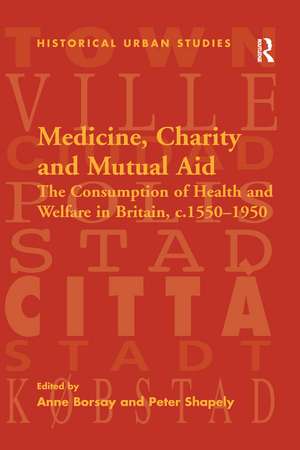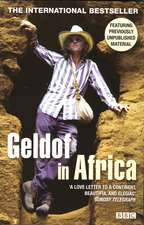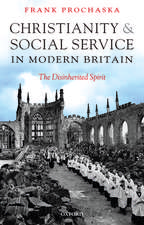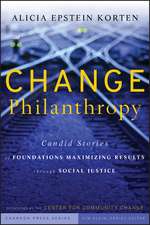Medicine, Charity and Mutual Aid: The Consumption of Health and Welfare in Britain, c.1550–1950
Autor Peter Shapely Editat de Anne Borsayen Limba Engleză Paperback – 30 noi 2016
| Toate formatele și edițiile | Preț | Express |
|---|---|---|
| Paperback (1) | 433.86 lei 6-8 săpt. | |
| Taylor & Francis – 30 noi 2016 | 433.86 lei 6-8 săpt. | |
| Hardback (1) | 1054.71 lei 6-8 săpt. | |
| Taylor & Francis – 28 apr 2007 | 1054.71 lei 6-8 săpt. |
Preț: 433.86 lei
Nou
Puncte Express: 651
Preț estimativ în valută:
83.03€ • 90.16$ • 69.74£
83.03€ • 90.16$ • 69.74£
Carte tipărită la comandă
Livrare economică 23 aprilie-07 mai
Preluare comenzi: 021 569.72.76
Specificații
ISBN-13: 9781138275652
ISBN-10: 1138275654
Pagini: 284
Dimensiuni: 156 x 234 mm
Greutate: 0.4 kg
Ediția:1
Editura: Taylor & Francis
Colecția Routledge
Locul publicării:Oxford, United Kingdom
ISBN-10: 1138275654
Pagini: 284
Dimensiuni: 156 x 234 mm
Greutate: 0.4 kg
Ediția:1
Editura: Taylor & Francis
Colecția Routledge
Locul publicării:Oxford, United Kingdom
Notă biografică
Anne Borsay is Professor in the School of Health Science, University of Wales Swansea, UK. Dr Peter Shapely is a lecturer at the School of History, University of Wales Bangor, UK.
Recenzii
’The essays in this collection are all strong works of historical research.’ Journal of British Studies
Cuprins
Chapter 1 Introduction, Anne Borsay, Peter Shapely; Chapter 2 ‘Pressed down by want and afflicted with poverty, wounded and maimed in war or worn down with age?’ Cathedral almsmen in England 1538–1914, Ian Atherton, Eileen McGrath, Alannah Tomkins; Chapter 3 From common rights to cold charity: enclosure and poor allotments in the eighteenth and nineteenth centuries, Sylvia Pinches; Chapter 4 Kinship and welfare in early modern England: sometimes charity begins at home, Sheila Cooper; Chapter 5 Deaf children and charitable education in Britain 1790–1944, Anne Borsay; Chapter 6 1An early version of this chapter was presented as a paper at the ‘British History in the Long 18th century’ seminar series at the Institute of Historical Research. I am indebted to the seminar, my intellectual home as a postgraduate, for their comments, which have been most helpful in developing my argument. Special thanks to Penny Corfield, one of the conveners, who was unable to attend the seminar but took the time to read and critique the paper., Stuart Hogarth; Chapter 7 Investigating the ‘deserving’ poor: charity and the voluntary hospitals in nineteenth-century Birmingham, Jonathan Reinarz; Chapter 8 Choice and the children’s hospital: Great Ormond Street Hospital patients and their families 1855–1900, Andrea Tanner; Chapter 9 Mental health care and charity for the middling sort: Holloway Sanatorium 1885–1900, Anne C. Shepherd; Chapter 10 Urban tuberculosis patients and sanatorium treatment in the early twentieth century, Flurin Condrau; Chapter 11 1The research for this paper was conducted with financial support from the Wellcome Trust Grant no. 060540. I am indebted to Robina Weeds for carrying out the research with such assiduousness, imagination and enthusiasm. I am also grateful to the editors for their helpful comments and patience., Barry Doyle; Chapter 12 The Co-operative Men’s Guild, citizenship and the limits of mutual aid 1911–1960, Peter Shapely; Chapter 13 Retelling the stories of clients of voluntary social work agencies in Britain after 1945, Pat Starkey;
Descriere
This book focuses on the recipients of charity, rather than the donors or institutions. By doing so, it tackles searching questions of social control and cohesion, and the relationship between providers and recipients in a new and revealing manner. It is shown how these issues changed over the course of the nineteenth century, as the frontier between state and the voluntary sector shifted away from charity towards greater reliance on public finance, workers' contributions and mutual aid. In turn, these new sources of assistance enriched civil society, encouraging democratization, empowerment and social inclusion for previously marginalized members of the community.













